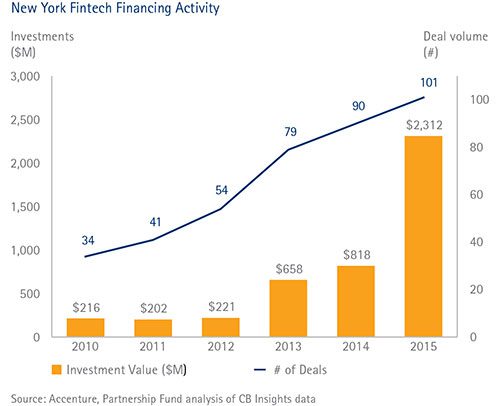Not all technology venture capital (VC) is flowing into Silicon Valley startups. In the first quarter (Q1) of 2016, and for the first time ever, New York City beat Silicon Valley in terms of fintech (financial technology) financing, $690 million versus $511 million, states Fintech’s Golden Age, a new report from Accenture and the Partnership […]
Datamation content and product recommendations are
editorially independent. We may make money when you click on links
to our partners.
Learn More
Not all technology venture capital (VC) is flowing into Silicon Valley startups.
In the first quarter (Q1) of 2016, and for the first time ever, New York City beat Silicon Valley in terms of fintech (financial technology) financing, $690 million versus $511 million, states Fintech’s Golden Age, a new report from Accenture and the Partnership Fund for New York City. In all of 2015, investments in New York totaled $2.3 billion, triple the amount raised by the area’s fintech startups the previous year.
It’s easy to attribute New York City’s rise in fintech scene to the proximity local startups enjoy to Wall Street banks and financial firms. But there are other forces at play, said Maria Gotsch, president and CEO of the Partnership Fund for New York City and co-founder of the FinTech Innovation Lab.

Each spring, the FinTech Innovation Lab, a collaboration between Partnership Fund for New York City and Accenture, selects six early-stage and growth companies, helping them hone their technology products in partnership with participating banks, financial firms and venture capitalists. The Lab’s sponsors include American Express, Bank of America, Morgan Stanley and Well Fargo, among several other financial industry giants.
As the FinTech Innovation Lab helped startups navigate New York’s VC landscape during the past few years, Gotsch noticed that the market still valued innovative entrepreneurs with an independent streak, but was increasingly rewarding those who were open to partnering with bigger institutions. Funding began to favor collaborators instead of competitors.
Gotsch said a trend developed as startups began encountering the challenges of growing their own platform. When fintech companies “get to a certain scale, they’re partnering with large institutions,” she told Datamation.
With ready access to funding, established customer relationships and their own considerable experience in maintaining large and complex IT ecosystems, New York City’s banks and other big financial institutions became natural allies for fledgling fintech companies. Funding aside, the area’s deep-pocketed firms are also looking to cut deals with startups that can help them bolster their services offerings.
“Financial institutions have made some major acquisitions,” said Gotsch. “Exits are always good.”
In terms of technologies to keep an eye on, blockchain is starting to attract Wall Street’s attention, said Gotsch. Best known as the distributed ledger technology that powers Bitcoin, blockchain is still in its infancy among mainstream financial companies, due in part to Bitcoin’s own controversial and uncertain past.
Scaling blockchain-based platforms is another challenge or an opportunity for startups that can crack the code. Today, Wall Street in engaged in “a very serious effort to figure out how to build distributed ledger and blockchain” technologies that can scale to handle the massive transaction volumes managed by today’s banking and trading platforms, said Gotsch.
Pedro Hernandez is a contributing editor at Datamation. Follow him on Twitter @ecoINSITE.
-
Huawei’s AI Update: Things Are Moving Faster Than We Think
FEATURE | By Rob Enderle,
December 04, 2020
-
Keeping Machine Learning Algorithms Honest in the ‘Ethics-First’ Era
ARTIFICIAL INTELLIGENCE | By Guest Author,
November 18, 2020
-
Key Trends in Chatbots and RPA
FEATURE | By Guest Author,
November 10, 2020
-
Top 10 AIOps Companies
FEATURE | By Samuel Greengard,
November 05, 2020
-
What is Text Analysis?
ARTIFICIAL INTELLIGENCE | By Guest Author,
November 02, 2020
-
How Intel’s Work With Autonomous Cars Could Redefine General Purpose AI
ARTIFICIAL INTELLIGENCE | By Rob Enderle,
October 29, 2020
-
Dell Technologies World: Weaving Together Human And Machine Interaction For AI And Robotics
ARTIFICIAL INTELLIGENCE | By Rob Enderle,
October 23, 2020
-
The Super Moderator, or How IBM Project Debater Could Save Social Media
FEATURE | By Rob Enderle,
October 16, 2020
-
Top 10 Chatbot Platforms
FEATURE | By Cynthia Harvey,
October 07, 2020
-
Finding a Career Path in AI
ARTIFICIAL INTELLIGENCE | By Guest Author,
October 05, 2020
-
CIOs Discuss the Promise of AI and Data Science
FEATURE | By Guest Author,
September 25, 2020
-
Microsoft Is Building An AI Product That Could Predict The Future
FEATURE | By Rob Enderle,
September 25, 2020
-
Top 10 Machine Learning Companies 2020
FEATURE | By Cynthia Harvey,
September 22, 2020
-
NVIDIA and ARM: Massively Changing The AI Landscape
ARTIFICIAL INTELLIGENCE | By Rob Enderle,
September 18, 2020
-
Continuous Intelligence: Expert Discussion [Video and Podcast]
ARTIFICIAL INTELLIGENCE | By James Maguire,
September 14, 2020
-
Artificial Intelligence: Governance and Ethics [Video]
ARTIFICIAL INTELLIGENCE | By James Maguire,
September 13, 2020
-
IBM Watson At The US Open: Showcasing The Power Of A Mature Enterprise-Class AI
FEATURE | By Rob Enderle,
September 11, 2020
-
Artificial Intelligence: Perception vs. Reality
FEATURE | By James Maguire,
September 09, 2020
-
Anticipating The Coming Wave Of AI Enhanced PCs
FEATURE | By Rob Enderle,
September 05, 2020
-
The Critical Nature Of IBM’s NLP (Natural Language Processing) Effort
ARTIFICIAL INTELLIGENCE | By Rob Enderle,
August 14, 2020
SEE ALL
ARTICLES







